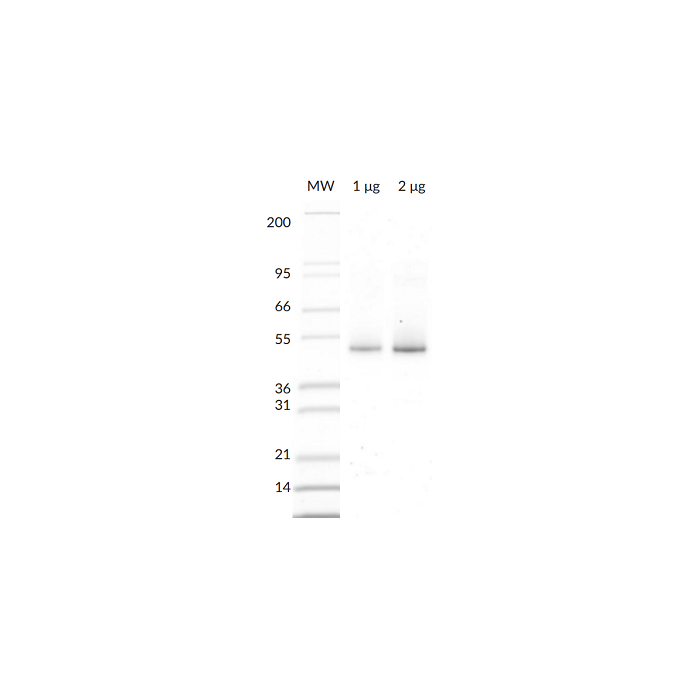Cookie Policy: This site uses cookies to improve your experience. You can find out more about our use of cookies in our Privacy Policy. By continuing to browse this site you agree to our use of cookies.
SouthBayBio
Parkin (E3 Ligase) (human) (rec.) (His)

| Product Details | |
|---|---|
| Synonyms | PARK2; E3 Ubiquitin-protein Ligase Parkin; Parkin RBR E3 Ubiquitin-protein Ligase; Parkinson Juvenile Disease Protein 2; Parkinson Disease Protein 2; PRKN |
| Product Type | Protein |
| Properties | |
| Source/Host | Sf9 cells |
| Sequence |
Human Parkin (Accession Nr. O60260) is fused at the N-terminus to a His-tag. |
| Crossreactivity | Human |
| Application |
Typical working concentration range is from 1-5µM. |
| MW | ~52kDa |
| Purity | ≥95% (SDS-PAGE) |
| Concentration | Lot dependent. |
| Accession Number | O60260 |
| Formulation | Liquid. In 50mM Tris-HCl pH 8.0, 200mM sodium chloride, 10% glycerol, 5mM TCEP. |
| Other Product Data |
Click here for a Typical Lot-specific Product Datasheet from the Original Manufacturer |
| Declaration | Manufactured by South Bay Bio. |
| Shipping and Handling | |
| Shipping | DRY ICE |
| Short Term Storage | -80°C |
| Long Term Storage | -80°C |
| Handling Advice | Aliquot to avoid freeze/thaw cycles. |
| Use/Stability | Stable for at least 1 year after receipt when stored at -80°C. |
| Documents | |
| Product Specification Sheet | |
| Datasheet |
 Download PDF Download PDF |
Parkin (Parkinson juvenile disease protein 2) is a ~52kDa E3 Ligase enzyme protein, encoded by the PARK2 gene. It plays an important role in the ubiquitin-proteasome system and acts as a regulator of protein breakdown. Parkin is located in the cytoplasma until a sustained depolarization occurs after which it is translocated to the mitochondrial membrane and induces the degradation of various membrane proteins. Parkin mutation leads to the accumulation of missfolded, aggregated proteins and degenerated mitochondria. The role of these changes in the pathomechanism of neurodegenerative diseases is well-known. Parkin mutation is responsible for about 50% of familial cases and for 10 to 20% of youth cases. Present views are that the improper regulation of protein aggregation and a dysfunction of the ubiquitin-proteasome system may be the common pathway of sporadic and hereditary Parkinson’s disease. In vitro, Parkin can be activated by treatment with recombinant PINK1, or addition of low concentrations of pS65-phosphoubiquitin. Parkin has been reported to generate poly-Ubiquitin chains in K6, K11, K48, and K63 linkages both in vitro and in vivo.






![Ubiquitin Activating Enzyme E1 [UBE1] (human) (rec.) (untagged)](https://adipogen.com/media/catalog/product/placeholder/default/adipogen_logo_bw_3.png)